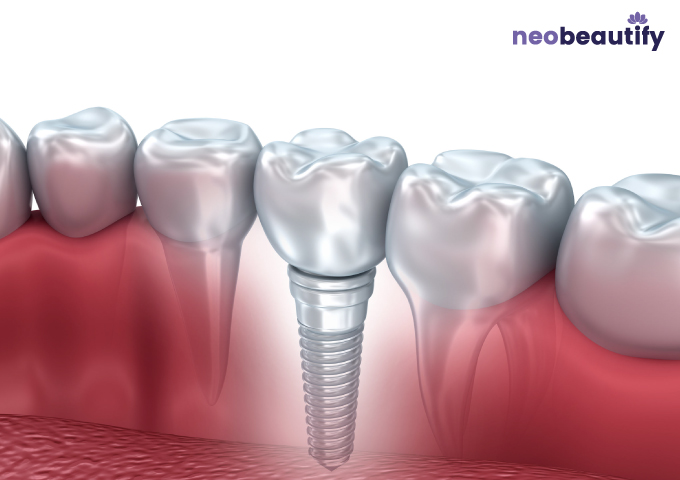Implantology
Implants are titanium-based artificial tooth roots placed in the jawbone to restore the function and aesthetics of missing teeth. Filling missing teeth with implant-supported restorations is a widely accepted treatment approach. These parts act as natural tooth roots. They are placed in the jawbone with a simple surgical procedure. Since the titanium used is tissue-friendly, the implant fuses with the bone and creates a very solid foundation for newly made teeth. After the impression and insertion stages, new teeth are prepared for use and your missing teeth are completed without damaging your natural teeth.
Implants also preserve the shape of the face, as they prevent bone loss in the absence of teeth. Implants are usually placed in two stages. In the first stage, the implant is surgically placed in your jawbone. The adaptation of the implant to the jawbone takes place within 2-4 months. When the implants are fixed to your jawbone, the second stage of treatment is started. The implants are opened and small titanium pieces are attached to the implants to support your permanent dentures. It will look extremely natural and beautiful when placed on your dentures. With this method, your other natural teeth are not damaged at all, only missing teeth are completed. Implants provide a better speech and chewing task than conventional bridge and dental prostheses, while also giving your face a natural look. Dental implant is a form of treatment that can give excellent results for patients and physicians when applied with correct diagnosis, sufficient knowledge and expert experience.
What are the advantages of implants?
Implants are mostly titanium-based screw or artificial root-shaped structures placed in the jawbones to restore the function and aesthetics of one or more missing teeth. It is expected that the jawbone in the area where the implant is to be placed will have the height and width to accept this implant screw. The biggest advantage of dental implants is that it prevents the loss of jawbone and tooth root caused by tooth deficiency. Since no more force is applied to the bone in areas with tooth decay, the brain perceives the bone in that area as a dysfunctional tissue. Therefore, bone loss begins in this region.
In traditional bridge prosthesis methods, the jawbone in that area continues to melt and disappear, since the force cannot reach the bone directly. A dental implant prevents this. The implant continuously stimulates the jawbone and stops bone loss as it helps the bone to function. In dental implant applications, there is no damage to other teeth. Therefore, other teeth continue to maintain their healthy structures. One of the most important advantages of implant treatments is that people use these implants for many years. If the person pays attention to their oral and dental health in general, they will use dental implants for life.
Why is it important to have healthy teeth?
Teeth are sensory organs that take part in many different areas of daily life. Chewing is an important role that teeth perform, and the ability to chew food is directly related to an individual's quality of life. As a result, teeth are important organs associated with quality of life due to their role in aesthetics, chewing and speech. When other organs in the body are compromised, a lot of energy is expended to prevent or even destroy further damage. Sadly, though, people don't seem to place that much value on protecting their teeth when it comes to our teeth. This is a negative behavior because the more teeth a person has, the higher their quality of life. Unfortunately, this vital organ, our teeth, is not invincible and can be lost for various reasons throughout a person's life. Periodontal diseases, caries and gum diseases can cause tooth loss at any age. In addition, the treatments given to patients for these diseases can cause tooth loss or poor prognosis.
In today's technology era, where dental implants are used very often, there are various treatment options such as periodontal treatment, endodontic treatment and dental implants for the recovery of teeth or the replacement of missing teeth.

